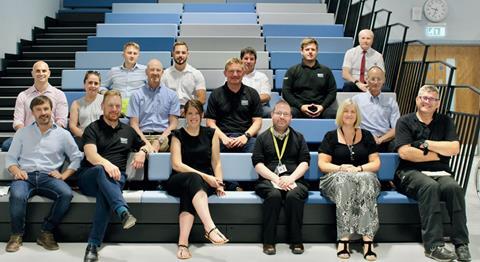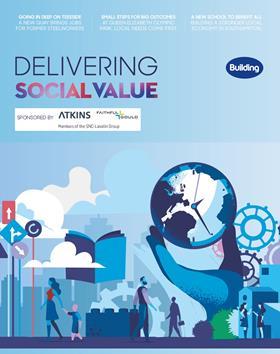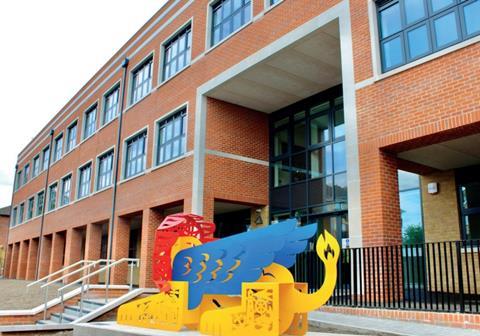The project to build St Mark’s school in Southampton focused from the start on benefiting the community both socially and economically, strengthening the local construction supply chain as well as enhancing skills and employment opportunities for the city’s people. By Jordan Marshall

Local benefit and buy-in were at the heart of the project to build St Mark’s Church of England School in Southampton.
According to Tom Balme, regional director at Faithful+Gould, this mindset was embedded from the outset.
“We looked to bring together a team of local consultants, but we understood it was best to leave that to the client [Southampton City Council] to determine who was best placed to deliver for the community,” he says. “We set up the interviews, handed them the matrix, they then populated it and ended up going with more local providers rather than going for the larger parent companies.”
Setting the priorities

Open dialogue with the council helped to establish early on what the project’s social value priorities would be: engaging the local community and enhancing skills and employment opportunities in the area.
“That was one of the things that Southampton [council] was keen to pull out of it,” says Balme.
“They’ve gone off and set up a construction academy alongside one of the local schools – which I’ve been involved in as well.”
>> An introduction to ‘Delivering social value’
>> Delivering social value: Going in deep on Teeside
>> Delivering social value: Small steps for big outcomes
This will help drive up industry recruitment in more ways than one, he says.
“One of the biggest issues, from my side of things, when it comes to attracting more people to construction, is that people don’t really understand what a project manager does; what a building surveyor or a quantity surveyor does. School engagements and the academy allow us to provide some insight.”

The full Delivering Social Value report will be published in our April print and digital edition on 21 April, 2023.
The case studies will be available individually online over the next fortnight.
The report has been produced by Building with Atkins and Faithful + Gould
Training opportunities
Through the project, Morgan Sindall – which delivered the scheme – agreed a five-year partnership with Redbridge Community School in Southampton, which will see the company support pupils with their learning, personal and academic development.
As well as creating training opportunities within its own business, the firm will leverage its own supply chain and contacts in the industry to help local people get on the construction career ladder.
In its appointment of both Faithful+Gould and main contractor Morgan Sindall, the council used the Pagabo framework, which makes social value a key requirement for project delivery.
ST MARK’S SCHOOL PROJECT: KEY FACTS
The first school built in Southampton to cater for pupils aged all the way from four to 16, St Mark’s provides 900 new school places as part of the city council’s drive to meet the needs of its growing population by creating a further 1,500 new secondary school spaces by 2023.
Procured via the Pagabo framework, with both Faithful+Gould and Morgan Sindall appointed using the professional services and major works frameworks, it completed in September 2022 – three months ahead of schedule.
It includes a new sports building located centrally within the site, which will serve both the primary and secondary school pupils.
But while this shows social value was already a focus for Southampton council, it was not quite a top priority, says Balme. The local specificity of the social value deliverables set for this scheme changed that.
“It’s that local benefits bit that makes it realistic,” he says.
“Everybody loves to talk about social value, and some of the numbers can be quite eye-watering. But when you start looking at what it what it actually means to the council and taking them through that journey to what it can do for them, it starts becoming a lot more real.”

The power of client buy-in
By amplifying the local impact and benefits as tangible deliverables, the client buy-in for social value increases, and that has a knock-on effect for future pipelines of development. Using the right consultants – often the same firms on repeat projects – is vital.
“Consultant appointments were based on a quality score along with a cost impact, not just in appointing the lowest-cost consultant to deliver a project,” says Balme.
This was imperative in building quality into the procurement of sub-consultants, not only on the St Mark’s school project but also on the council’s future projects.
Social Value Live is back for 2023, with registrations now open to the free-to-attend event.
Running across two days this year’s event will cover a range of topics including designing for neurodiversity, the implications of 15-minute cities, and plenty more.
Local supply chain resilience was bolstered too as part of the scheme’s social value offering – something Balme sees as particularly significant in an area like Southampton, where extensive construction and redevelopment work is under way.
He says the geographical proximity of the project team was also integral to the success of the scheme, which ended up being completed three months early.
“The design team that’s been chosen – we did get that local buy-in. I think that has made a difference,” says Balme. “The amount of time you usually see the architect on site was definitely surpassed on this scheme.”

ArchitecturePLB, which has offices in nearby Winchester as well as London, was appointed back in 2018 and continued to be involved all the way through to completion.
The use of smaller, locally based firms can allow a more hands-on approach, says Balme. “Often a smaller firm, or firm with a local office, is able to provide a level of focus on schemes that national firms aren’t always able to.”
This, he points out, is another benefit of strengthening the local supply chain: “The council has a major school building programme in place that will ensure this particular social value benefit continues to be amplified.”
Learning lessons
What Balme considers most important on the project overall is that all parties – whether that be Faithful+Gould, the council or the other members of the supply chain – look to take away not only the many positives, but also the areas to learn from on future projects.
From a social value perspective, he says, “we’ve actually gone over and above in terms of what we provided on this project – but I don’t think we were prescriptive enough at tender stage to request the information from [the supply chain] that we’ve ended up getting,” he says.
“An alternative contractor might not have picked it up with such a focus”. So in future he would incorporate such information requirements within the procurement package.
TOM BALME, FAITHFUL+GOULD

Tom Balme is a regional director for Faithful+Gould and is based in Southampton.
He has been with the firm since 2016, when he began as head of project management and building surveying in the Southampton office.
He has worked on a range of projects in the area and with clients including both Southampton and Bournemouth councils, as well as Arts University Bournemouth.




























